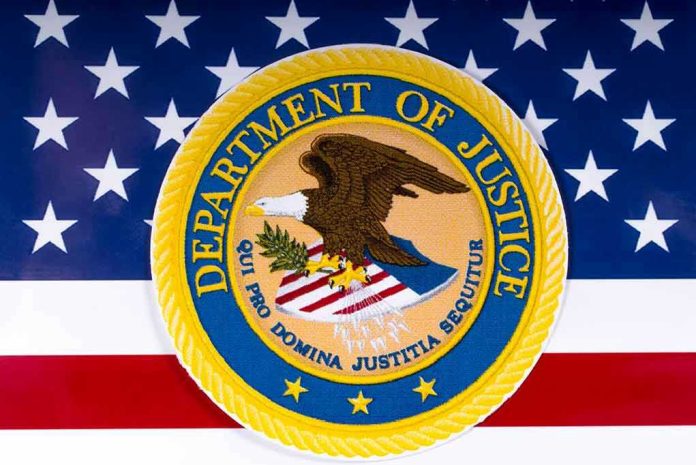
A quiet Department of Justice memo just put an end to pronoun mandates in federal email signatures—and it signals a broader retreat from compelled speech across government.
Story Snapshot
- DOJ instructs employees to remove preferred pronouns from official email signatures, prioritizing neutral, professional identifiers.
- Policy shift aligns with 2025 trends emphasizing transparency, accountability, and restoring public trust after years of institutional overreach.
- Move reflects a wider rollback of politicized workplace rules in federal agencies under the new administration.
- Critics call it exclusionary; supporters say it protects viewpoint diversity and keeps government focused on core missions.
What The DOJ Memo Changes And Why It Matters
Department of Justice managers directed staff to keep email signatures professional and content-neutral, excluding preferred pronouns and ideological taglines. The instruction standardizes official communications, reduces ambiguity about identity fields, and removes pressure on employees to adopt contested language. The shift follows years of complaints from career staff who felt compelled to display pronouns to avoid reputational risk. The practical effect is clarity: names, titles, and contact information return as the sole contents of signatures, limiting culture-war drift inside agencies.
Federal lawyers argue that official channels should avoid compelled expression unrelated to job duties. The memo positions the DOJ to defend consistent First Amendment-sensitive practices across agencies while minimizing internal HR conflicts. By curbing signature activism, the department reduces grievance filings and compliance training churn that rarely improves mission performance. The approach mirrors broader 2025 governance priorities that elevate transparency, measurable results, and mission alignment as the path to rebuilding credibility after a period of politicized directives.
Link To The 2025 “Public Trust” Imperative
Independent 2025 assessments show a worsening trust environment, with Americans reporting higher polarization and declining confidence in federal institutions. Analysts warn that if citizens do not trust key institutions, executing improvements across security, preparedness, and education becomes harder. Centering official communications on neutral, verifiable information rather than ideological signaling aligns with evidence-backed trust maintenance: keep messages factual, limit performative rhetoric, and emphasize professional competence over culture-war cues.
Trust research also highlights a grievance gap—millions believe institutions serve narrow interests while regular people struggle. Policies that strip politics from government correspondence can blunt perceptions of elite capture. When public-facing emails read the same in every office—name, role, phone—government looks less like an arena for activism and more like a service enterprise. That can support employee confidence, reduce customer confusion, and help the DOJ present as an impartial law enforcer amid intense national division.
Implications For Free Speech And Workplace Standards
The memo reduces compelled speech risk for employees who object to adopting contested terminology. It also helps supervisors enforce evenhanded standards without adjudicating identity disputes, a task beyond the government’s remit. The rule does not police private beliefs or lawful off-duty expression; it confines rules to official channels. That distinction matters for constitutional alignment: government speech is mission-bound, while individual speech remains protected. Uniform signature formats clarify that agency email is government speech, not a personal platform.
Policy reversals across agencies often trigger backlash and confusion. A clear, narrow standard better withstands litigation and avoids whiplash between administrations. Consistency lowers training costs, shortens onboarding, and reduces compliance audits that sap time from casework. If the goal is restoring core competence—investigations done right, deadlines met, decisions explained—then neutral signatures are a low-cost, high-clarity fix. They signal discipline in the small things, which often correlates with discipline in the big things the public actually cares about.
How This Fits A Broader Federal Realignment
Multiple 2025 analyses describe a government struggling with legitimacy amid polarization and grievance. Reforms that prioritize simplicity, speed, and verifiable action are gaining traction as practical steps to rebuild trust. For right-leaning audiences long frustrated by ideological creep in HR policy, the DOJ step reads as course correction: fewer culture skirmishes at work, more focus on crime, corruption, and constitutional enforcement. Neutral signatures cannot fix deeper problems, but they reduce one visible symptom of politicized bureaucracy.
DOJ Issues Memo Banning Preferred Pronouns In Email Signatures – Conservative Review https://t.co/iOEXmvzGt4
— ConservativeLibrarian (@ConserLibrarian) August 12, 2025
Limits remain. Not every agency will move in lockstep, and some offices may carve narrow exceptions for legal or accommodation reasons. External critics will argue the change chills inclusion. The test will be execution: leaders must pair the rule with clear guidance, consistent enforcement, and transparent channels for employees to raise concerns. If implemented cleanly, the DOJ standard can model a repeatable practice—keep government communication professional, mission-focused, and free from compelled ideology—without inviting unnecessary legal fights.
Sources:
2025 Edelman Trust Barometer: with widespread grievance, business has a big job ahead
Polarized and Distrustful: How Culture Changes since the Pandemic Affect Preparedness
2025 Edelman Trust Barometer (Global Report)
Crisis PR Done Well: 2025 Playbook for Trust, Transparency, Transformation
Key Takeaways from the 2025 Edelman Trust Barometer







